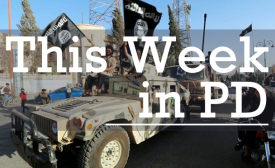iraq
US Secretary of State John Kerry and Defence Secretary Chuck Hagel, pressed a core coalition of 10 nations at a NATO summit in Wales on Friday to go after the Islamic State (IS) in Iraq and Syria militarily and financially. "There is no time to waste in building a broad international coalition to degrade and, ultimately, to destroy the threat posed by the Islamic State," Kerry and Hagel said in a joint statement.
The Islamic State released a video on Tuesday purporting to show the beheading of American hostage Steven Sotloff, raising the stakes in its confrontation with Washington over U.S. air strikes on its insurgents in Iraq.
Human Rights Watch, another nongovernmental watchdog group, reported that Islamic State has used cluster munitions in at least one location: in the town of Ayn Al-Arab, 80 miles northeast of Aleppo city. The use of such ordnance leaves many unexploded bomblets on the battlefield, posing a serious risk to civilians long after hostilities have ceased. The munitions, which eject smaller explosive bomblets over an area, were banned in 2010 through the Convention on Cluster Munitions, though many countries -- including the U.S.
Aircraft from the United States, Australia, France and Britain on Saturday dropped humanitarian supplies to the Iraqi town of Amerli, which has been under siege by "Islamic State" jihadist militants for almost two months, the US Pentagon says. In a statement, Pentagon press secretary Rear Admiral John Kirby said the airdrop, made at the request of the Iraqi government, had been supported by US airstrikes on the besieging militants.
In a polarized region and a complicated world, the Islamic State in Iraq and Syria presents a unifying threat to a broad array of countries, including the United States. What’s needed to confront its nihilistic vision and genocidal agenda is a global coalition using political, humanitarian, economic, law enforcement and intelligence tools to support military force.
In the UK’s biggest ever response to a humanitarian crisis, the government has committed over £600 million to help those affected by the conflict in Syria – the second highest total after the US. Aid is being allocated to help a million refugees in Syria, Lebanon, Jordan, Turkey and Iraq.
There are extraordinary elements in the present U.S. policy in Iraq and Syria that are attracting surprisingly little attention. In Iraq, the U.S. is carrying out air strikes and sending in advisers and trainers to help beat back the advance of the Islamic State of Iraq and the Levant (better known as ISIS) on the Kurdish capital, Erbil. The U.S. would presumably do the same if ISIS surrounds or attacks Baghdad. But in Syria, Washington’s policy is the exact opposite: there the main opponent of ISIS is the Syrian government and the Syrian Kurds in their northern enclaves.

This week in PD, the world witnessed the propaganda of violent extremist groups, including the Islamic State.







